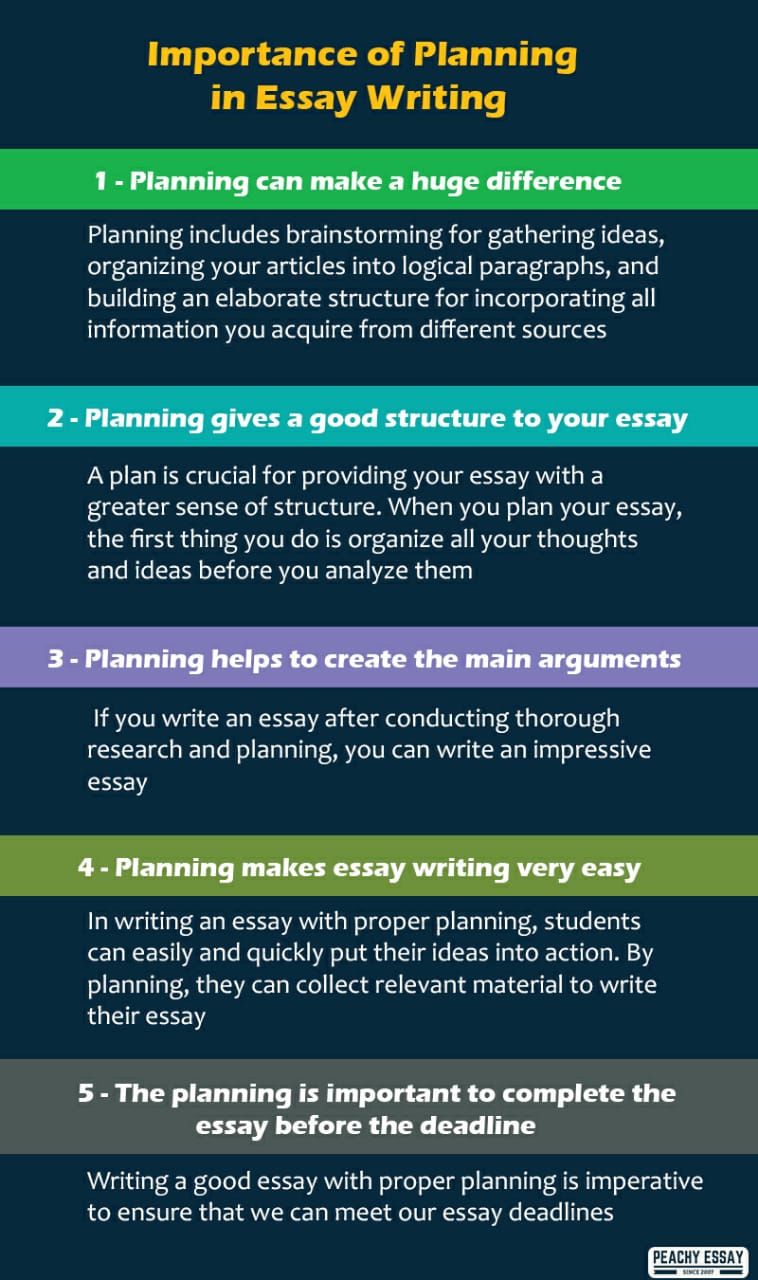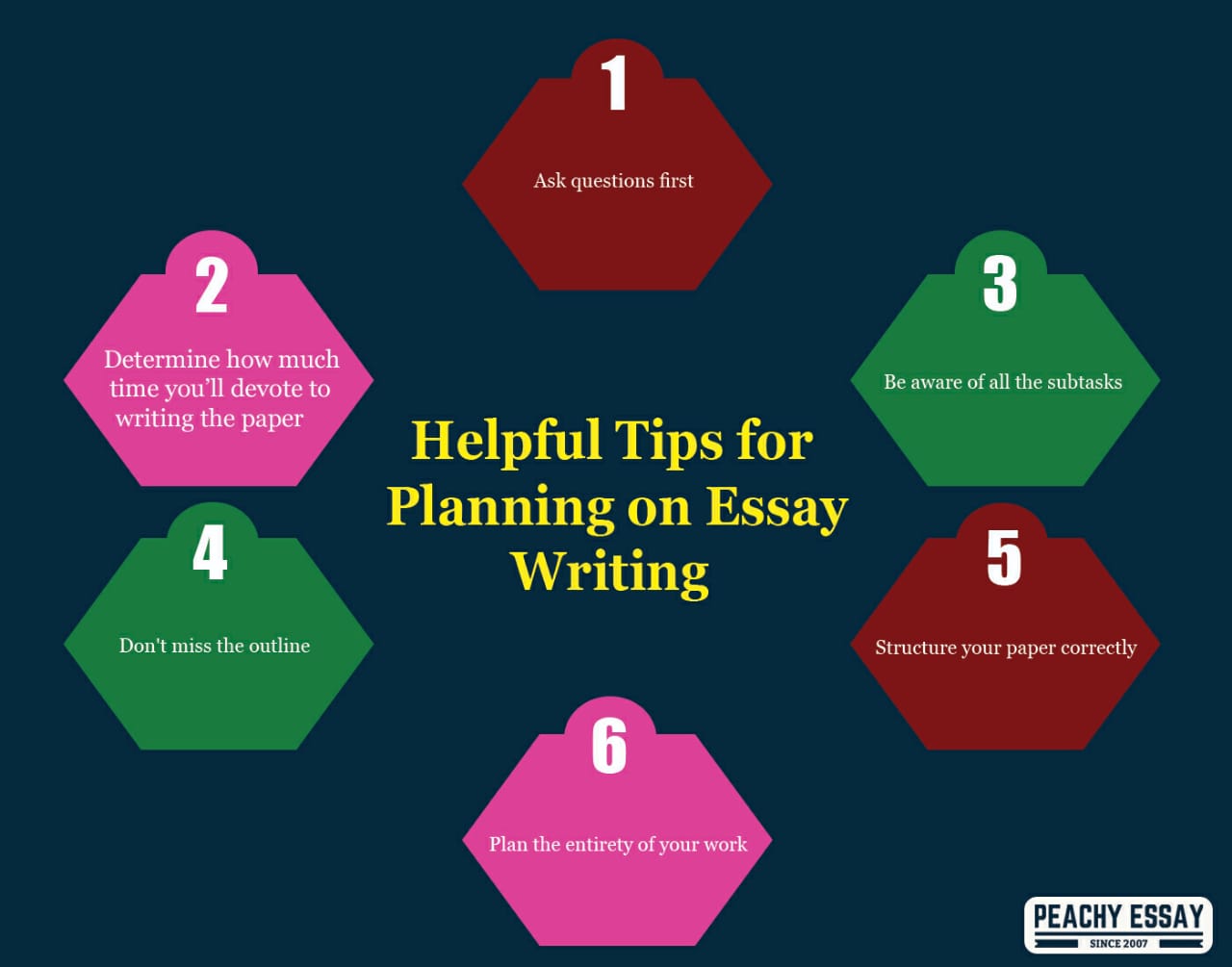Planning is considered indispensable to accomplish any goal, no matter what industry you operate in or what a critical task you have to perform.
In every field or every task, planning is essential if you want to get success. Additionally, planning is also essential if you want to achieve success in your academic homework and tasks.
Planning everything will be important for your success in everything you do, whether it is homework or academic assignments, or essay writing. This is why students ask the same question every time: What role does planning play in essay writing?
An essay is one of the assignments that greatly affect a student’s performance in an academic setting, so it becomes imperative to write an essay well.
Students must take some time to plan for essay writing to write a successful, effective, and winning essay before the deadline.
What is Planning in Essay Writing?
Writing a plan is the process of figuring out what you ought to include in your essay. Therefore pre-planning is a necessary process for essay writing.
Having an essay that is well-organized and planned makes many essential things important such as, you can organize your thoughts and make everything logical and clear.
When well-structured, a well-planned essay allows the reader to understand the writer’s thoughts and opinions quickly.
The Importance of Planning in Essay Writing
Many students seem to have difficulty when it comes to planning an essay and asks the same question regarding why planning is important.
In this article, we will be discussing the importance of planning in essay writing. These include the following points:

Planning can make a huge difference
If you intend to write an impressive, informative, and good essay, you must plan accordingly before you write.
Planning includes brainstorming for gathering ideas, organizing your articles into logical paragraphs, and building an elaborate structure for incorporating all information you acquire from different sources.
Afterward, change them so that they are as clear as possible for the reader. If you do good planning, you will be able to achieve successful and effective writing.
Planning gives a good structure to your essay
A plan is crucial for providing your essay with a greater sense of structure. When you plan your essay, the first thing you do is organize all your thoughts and ideas before you analyze them.
Now you need to review the evidence you have to back up your argumentative statements and main ideas. Whenever any student is tasked to write an essay, he lays out his main ideas and finds evidence.
Therefore, you are composing an essay after great planning. This gives your essay an obvious and logical structure. Examiners can easily catch your thoughts and ideas presented in your paper.
Planning helps to create the main arguments
Moreover, if you plan your work well, it increases your chances of success. Thus, if you write an essay after conducting thorough research and planning, you can write an impressive essay.
Actually, when planning or seeking information, the students find unique and credible information regarding the topic and many significant and persuasive arguments.
Hence students can use this argument in their writing that can support its essay topic. Therefore planning in essay writing is also helpful for students for developing new or original arguments.
Planning makes essay writing very easy
In writing an essay with proper planning, students can easily and quickly put their ideas into action. By planning, they can collect relevant material to write their essay.
Therefore, when you have everything in place, perfect writing will not be a problem.
But if you are writing an essay without proper planning and research, then you have to collect information and do writing at the same time.
The planning is important to complete the essay before the deadline
A good essay writing plan encompasses both the selection and submission of essay topics. Our plan is made according to the directions of our teacher and the deadlines that the teacher gives us to submit each essay.
So, writing a good essay with proper planning is imperative to ensure that we can meet our essay deadlines.
The Step-by-Step Process of Planning in Essay Writing
Before beginning the writing of an essay, students must take some time to plan their essay to ensure that they write an appealing and worthwhile essay before the deadline.
There are several steps in the pre-planning process for essay writing, and these steps show just how important planning is when writing an essay.
Understand the Question
Take your time to understand the questions provided. Remember that you can always ask your teacher for clarification if you’re unclear on anything.
What is the question’s purpose? If open-ended, you need to consider which aspects to focus on in your answer. Keep in mind you may have to explain the reasoning behind your decision to focus on this aspect in your essay introduction, so take notes on the reasoning.
When responding to a closed question, your response must refer to and stay within the boundaries of the question (i.e., specific dates, texts, or countries).
Finally, organize your assignment questions by breaking them down into parts. Find out what the task word means (ex: discuss, argue, describe) and determine what to write about.
It frequently happens that teachers complain about students not answering the questions in the essays they assign. Usually, teachers give their students essay writing assignments on a specific topic. Students can be assigned essay writing on any question or problem.
When writing an essay, you must make sure that there is no confusion regarding the topic or question of your essay.
Your teachers and seniors should address any difficulty or confusion. Once you understand the question, you should begin the essay writing.
Keep in mind the instructions and deadlines
Teachers often give their students some instructions or deadlines when it comes to essay writing. In this case, be sure to take these instructions or deadlines into account when planning your essay.
Write your essays based on the deadline and instructions your teacher gives. It would be best to plan essay writing according to the deadline and directions you receive from your teachers.
If you have a due date for submitting your essay paper, you must check how much time you will have left to complete your essay. After that, you may begin your planning according to the time you will have left.
Brainstorm for Ideas
This stage will include brainstorming all your ideas about the essay writing topic. After this, you should acquire knowledge about everything you need to write the essay successfully.
To do so, find out which facts concerning the topic you are already aware of and which facts you do not know about.
In short, here you have to answer 4 questions-:
How much do you know about the topic?
What is it you require to know about the subject?
Do you have any thoughts on the conclusion?
Are there any reliable resources on the topic?
Make a Plan and draft an outline
You must make a plan and make a clear outline for your essay. By doing so, your essay will have a more cogent argument and allow you to work out a logical structure that emphasizes your claim before beginning to write.
Now you have to do effective planning and strategy for your essay writing to write a successful essay. Only with successful planning and strategic thinking can you write a successful essay.
The planning makes the essay coherent, and it also allows a logical structure and strong statements for your argument before starting essay writing.
Planning is one of the easiest ways to lessen your fear of essay writing. Planning will help you choose the right words to say what you mean.
The key to making your audience understand your argument is by having your points discussed in a logical order. To do this, you can write out each point on index cards or sticky notes and then physically move them around until they make sense, especially the progression of your argument.
Please do not skip any of your points, and make sure the reader knows the connection between them. In short, continue to guide the reader through and communicate with them every step of the way.
Drafting Your Outline
Introduction: Here, you are supposed to address the question, why it’s important, and what the essay will accomplish. Develop a clear mission statement.
Main Body: You need to sequence your arguments to make a convincing argument. Remember to write each paragraph with one main point.
Start with a topic sentence to introduce your main point for the paragraph; then explain it further; provide evidence for your claim; interpret your conclusions based on your evidence; conclude by summarizing your points and providing evidence to support your claim.
Each paragraph should be linked to the next with transition words or phrases such as ‘in addition,’ ‘in consequence;’ and ‘furthermore….’
It is beneficial to arrange the paragraphs logically and consistently and test out different sequences until you find the best flow.
Conclusion: Write a summary of your arguments, and show how they address the original question.
Write Your Essay
After you’ve completed your outline, you’re ready to write your article. Remember, you need to make sure that you proofread your essay, get others to read it over, and read it aloud for spelling and grammar mistakes.
As soon as you have gotten feedback from others and highlighted the areas for refinement, you can begin writing the final draft of your essay. Do not fear doing this multiple times until you are satisfied with your work!
Tips for Planning on Essay Writing
To get your message across, you will need to plan to produce a clear and coherent paper.

Ask questions first
When planning your paper, ask yourself the following simple questions:
What is the subject of your paper? The answer to this question can help you plan further and develop a thesis statement.
Is your paper likely to contribute significantly to the sphere in which it’s written? Have you come across anything similar to your paper in the past? Is it expected to connect to any of the previous findings in that sphere?
How will your findings influence the discipline? Do they present new perspectives, words, or theories?
What is going to be interesting in your work? What is your target audience?
Getting these answers before you make a writing plan will give you a better sense of what direction to take in your research. These answers are likely to change your entire writing process from what you expected it to be earlier.
Determine how much time you’ll devote to writing the paper
By setting smaller deadlines, you will be better prepared to complete everything on time and by your paper plan.
Prewriting should be 50% of the total time. Take this into consideration when choosing a due date and you can split the time equally in half. Once you receive the due date, stop preparing and begin writing.
Any of these strategies can be used for writing the research paper or an essay, as well as any other assignment.
Be aware of all the subtasks
The prewriting process encompasses lots of subtasks. Planning your paper involves doing lots of research.
Besides the research itself, planning a paper also includes one or more of the following:
Make sure you closely follow all the instructions concerning your paper. Knowing the editing and formatting requirements and the word count will make it simpler to create your paper.
Select the topic that is most interesting to you. That way, you can be fully engaged in the writing process.
Take the time to collect all the recurrent terms and ideas so that you can organize them strategically.
Don’t miss the outline
A paper plan won’t be complete without an outline. You’ll use the outline to summarize everything you can find to figure out what to write about.
In addition to allowing you to see your paper as a whole, an outline will also allow you to re-evaluate your research. You can assess all the facts and information and determine what needs to be changed.
Structure your paper correctly
While creating your outline, you can avoid one common mistake many students make. The structure of your paper must be independent of the structure of the source material.
Consequently, if you are writing a paper about a certain historical period, for instance, you do not have to explain events chronologically.
Your paper should present your own argument but not merely repeat what is already stated in the source material.
With the free structure of your paper, anyone reading it can skip to the parts they care about without reading the entire thing. Instead of following a set plot, you can deliver your arguments compellingly and persuasively.
Plan the entirety of your work
Even though the prewriting portion takes most of the time, you’ll spend on your paper; this does not mean you can’t plan the tasks you’ll do after that.
And there are plenty of things to focus on. As with setting a prewriting deadline, you can also set deadlines for the rest of your tasks, including drafting, revising, editing, and proofreading. This will help you stay on the right track and estimate how much time is left.




